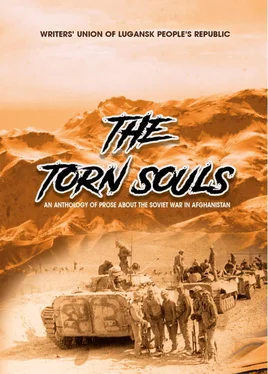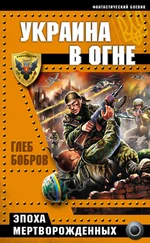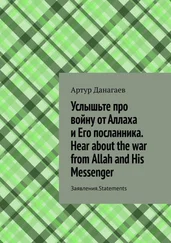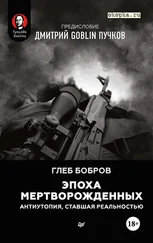We scrapped up money for his vacation… and Vitek, such a handsome brave Soviet soldier, took off to home, representing an eagle-paratrooper, hero-internationalist, well, no less as an iconic reprint of the Soviet army.
In a month-or-something Vitek returned back. According to military traditions, he brought us samogon (homemade brew), hidden inside of quite a few hot-water rubber bottles. Coming from his town, bordering Ukraine, Vitek presented to us homemade salo (a traditional Ukrainian type of bacon). Vodka, together with homemade sausages, was also presented to “father”-commanders. How he brought it across all borders — he kept silent. Despite being late from his vacation by two weeks, Vitek did not get any penalty.
— Okay, — Vitek started telling us his story — I am standing in my parade uniform in the court, the medal shines on my chest, and my wife came to the Court together with her new big-nosed Caucasian boyfriend whose entire body was covered with gold. I did good job to press my lips together to stop laughing and to keep my stone-face with no emotion. With my honest red eyes — red from non-stop celebration because a day prior the court we drank a lot, — I answered all questions. The judge was an elderly woman, who knew Second World War disasters; she looked at me and pitifully sighed. She announced the court decision in the name of the Soviet Union, to divorce us to hell, and then she asked us to hold on for a moment. We waited…and then the judge began swearing to my now ex-wife, telling her, in foul language: how bad a wife she was, and while I was defending the Motherland, she was turning hanky-panky here, and she should not have any respect from our society of Soviet people. I was sadly nodding with my head. It was a circus for free! And then in order not to spoil this performance, I ran out having no strength to control my laughing.
At the exit of the court, my mates were already waiting for me with more vodka. Our town is small and everyone knows each other. All ex-paratroopers gathered together as we all do on the 2nd of August (A National Day of Army Special Forces celebration — Editor). We drank first and then we went to our local market where we had great fun bashing Caucasians. How we beat them! How their goods from shops flew away in all directions! The Police turned blind eyes, see nothing, hear nothing. Yep, it was a great time! But then my mates decided to punish my wife, the traitor, and to dirty her with a tar and to carry around the town, I disagreed. I said to my fighting brothers: “What for? God will judge her. As for me, I forgave her”. The mates were surprised with my Christian attitude, but obeyed.
Vitek stopped telling the story, propped up his violent head with his hand and became thoughtful. Such a pose vividly reminded me of Gerzen’s novel “The past and thoughts” (see “Terminology and Glossary” — Editor).
Although, I was sure that, due to an unsettling type of personality, Vitek did not read this book written by Gerzen, neither have heard of this name.
— So what was happening next?
— Next! You could believe or not, mates, but on the 10th day after the divorce I got married (Author’s comment: any decision of the Civil court, including divorce, comes into force after ten days). We registered our marriage at the Civic office of marriage registration with no waiting time. The whole town was celebrating our wedding. Have a look the picture.
I took the photo. From the colored photo a young girl in her white wedding dress looked at me with a very nice smile. The happiness, hope and something else in her smile were so special, that it made my heart race.
— I hope, you do really love her! — I said.
— Of course! — Vitek answered without any hesitation. He took the photo and began to admire his darling. After a minute of silence, he added with a strong affection, — My dear! Maybe you will file for our divorce too? I wish to go home…for a vacation.
I became speechless. What else could I say?
In a fall of 1981, Vitek was killed during combat operation in Faizabat. We did not leave his body there.
Today to listen to any “enemy’s” radio is not a crime neither an ideologically immature act. However, in the early eighties of the twentieth century, the “enemy’s voices” had been oppressed as much as possible, so the amateurs must listen to them in complete secrecy and conspiracy. I like listening to these “enemy’s” voices, not because of their music or the high political consciousness and ideology, but simply due to my indifference to them. Once upon time, the Russian section of the radio station “Voice of America”, spoke about me, incognito, of course. My name, as well as the names of my comrades serving in the same brigade, were not vocalized, so we were simply named “Russian commandos”.
The tactic of our battalion was very simple at that time: directed by the army intelligence, we were “combing” villages, lying in ambush. Quite often jumping from helicopters, we had to block entrances and exits of the mountain gorges, while motorized infantry or units of the Afghan army caught mujahedeens (see “Terminology and Glossary” — Editor) in the lowlands. Sometimes we were successful, sometimes not. As the saying stated — “it cannot be perfect every time”. Well, I am not going to reveal all tactics of the Soviet paratroops. My story is about the radio station “Voice of America”, the Second Company, and army jokes.
As usual we landed from helicopters into the mountains, it was a habitual routine. We quickly blocked the exit and entrance of a gorge and equipped our positions for firing from a prone position by digging trenches. We camouflaged the trenches and reinforced our cover with stones. The commanders estimated the outcomes of the enemy’s possible actions, and in the case of an attack, divided soldiers accordingly into firing sector groups, and the paratroops were ready for a battle. Nothing special, everything was in line with so-called “military routines”. After arranging these temporary firing points, four volunteers went on a scouting mission.
Just do not get the wrong idea that we were eager to demonstrate our bravery by searching for mujahedeens. No! We simply were looking for anything or something to eat.
Our provisions were disgusting. At our military unit, the battalion’s kitchen offered the following daily menu: a watery soup with dried potatoes and chunks of boiled fat; a porridge with vegetable oil; and compote from dried worm-eaten fruits, which we named “a meat broth”, as it was full of boiled worms. When we were “in action”, a travel ration of food includes canned fish with an expired date; a package of crackers, and that was it. Canned food rations were calculated at 200 grams per day per head. When we very modestly tried to tell the deputy brigade commander that we wanted to eat, he opened his arms and replied with the saying: “A paratrooper, like a hungry wolf should be hunting all day long: your feet are your supply”. So, you will not be surprised to learn that in the military operation, we were like a pack of hungry wolves. Our combat force officers, who ate a little better than we did, turned a blind eye on food looting and in return, they received their share. You certainly can condemn us, but you cannot blame us. We just wanted to eat!
So, we — four secret service agents-looters — are coming to the mountains and valleys, for hunting. Eventually, we found a large field, full of melons — gorgeous, juicy, sweet, savory melons. But as experienced soldiers, at first, we observed the area for any potential military action, to be sure not to be running into the real enemy and get a good portion of lead instead of melons. There had been, you know, some precedents before and, we learnt our lessons. We did not find any insidious mujahedeen, except an old man who was guarding this field. We did not consider him to be an enemy. We waved hello to the grandpa and began our first round of eating, then started gathering the melons into a ground sheet. The grandpa expressed his presence in a voice and we waved back to him. After this, we did not pay any attention to him. We picked up all melons in the ground sheet and we were ready to depart back home, when in the climax of our operation, we heard an unexpected gun shot… We didn’t hear the rumble of the gunfire, but the shot whizzed dangerously close.
Читать дальше










